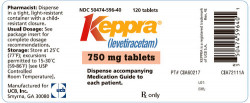Keppra (levetiracetam) Coupons, Discounts & Cost
Keppra is an anticonvulsant and antiepileptic drug active against both generalized and partial seizures. One way to save money on the Inspra (eplerenone) retail cost regardless of income and insurance status is to use Inspra coupons or discount cards from RXCoupons. Use our Eplerenone coupons at your online pharmacy and receive up to 75% off the sale price each time you refill your prescription.
Keppra (levetiracetam) medicinal properties
Keppra is an anticonvulsant and antiepileptic drug active against both generalized and partial seizures.
Keppra (levetiracetam) indications for use
Keppra (levetiracetam) is used in conjunction with other medications to treat certain conditions: epilepsy (oral solution for partial seizures in adults and children older than 1 month; solution and tablets for children older than 4 years), juvenile myoclonic epilepsy, myoclonic seizures in adults and children older than 12 years, idiopathic generalized epilepsy (tonic-clonic seizures in adults and children older than 12 years).
Keppra is used as monotherapy in partial seizures in adults and adolescents from 16 years of age with newly diagnosed epilepsy.
Keppra (levetiracetam) contraindications
This medication is not used in the following cases: - Children: up to 1 month (for oral solution); - Children: up to 4 years (solution for infusion, tablets); - Hypersensitivity to levetiracetam and other components of the drug.
The drug should be taken with caution in patients older than 65 years of age and those with diseases of liver and renal failure.
Keppra (levetiracetam) administration
The dosage form of the drug should be chosen by the attending physician. The daily dose for tablets or solution should be divided into 2 equal doses. Keppra tablets should be taken with water.
Doses for monotherapy (for partial seizures in adults and adolescents over 16 years): the initial dose - 500 mg per day (divided in 2 doses of 250 mg). The dose can be increased after 2 weeks up to 1000 mg per day (divided into 2 doses of 500 mg). The maximum daily dose is 3000 mg (divided in 2 doses of 1500 mg).
Complex treatment (children from 1 month to six months): Keppra is prescribed in the form of oral solution in an initial therapeutic dose of 7 mg/kg 2 times a day. The dose can be increased to 21 mg/kg two times a day depending on tolerability. The recommended dosage of oral solution for children and adolescents aged six months to 17 years is 10 mg/kg 2 times a day. The dose can be increased to 30 mg/kg two times a day depending on tolerability.
Children over 4 years should start the therapy with a dose of 20 mg/kg per day divided into 2 doses (10 mg/kg two times a day). Increase the dose by 20 mg/kg every 2 weeks until you reach the recommended dose (60 mg/kg per day). In case of intolerance, the recommended daily dose may be lower.
Keppra (levetiracetam) side effects
The most frequent adverse reactions: somnolence, nasopharyngitis, headache, dizziness and fatigue. Hepatobiliary system: rarely - hepatitis, liver failure. Respiratory system: often - cough. Immune system: rarely - DRESS syndrome; very often - nasopharyngitis. Skin disorders: often - rash; rarely - eczema, pruritus, alopecia, Stevens-Johnson syndrome, toxic epidermal necrolysis, erythema multiforme. Musculoskeletal system: rarely - myalgia, muscle weakness. Blood and lymphatic system: rarely - leukopenia, thrombocytopenia, agranulocytosis, pancytopenia, neutropenia. Nervous system: very often - headache, drowsiness; often - dizziness, tremor, lethargy; rarely - short-term memory loss, amnesia, impaired coordination, decreased concentration, paresthesia, dyskinesia, choreoathetosis, hyperkinesia. Metabolism: often - anorexia; rarely - decrease or increase in body weight. General disorders: often - asthenia; rarely - blurred vision, dizziness (vertigo). Digestive system: often - diarrhea, dyspepsia, abdominal pain, nausea, vomiting; rarely - pancreatitis. Psychiatric disorders: often - aggression, depression, anxiety, insomnia, irritability, nervousness; rarely - suicide attempts, behavioral disorders, psychotic disorders, hallucinations, confusion, emotional lability, agitation, panic attacks, personality disorders.
Keppra (levetiracetam) special instructions
Food intake may reduce the rate of absorption of levetiracetam.
Levetiracetam may affect kidney function in patients with kidney disease and decompensated liver disease.
There are reports of suicide attempts and suicide during levetiracetam therapy, so patients should immediately report of the occurrence of any suicidal or depressive symptoms.
Keppra causes drowsiness in some patients. They should refrain from activities requiring high concentration.

